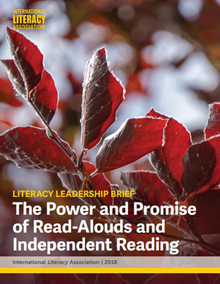
Teacher-led read-alouds and in-school independent reading—the cornerstones of effective literacy instruction—have the power and promise to set students on a path of lifelong reading, according to research highlighted by the International Literacy Association’s (ILA) recent brief, The Power and Promise of Read-Alouds and Independent Reading.
For many U.S. students, in-school time is their only encounter with books, says ILA. As instructional time is increasingly devoted to content coverage and standardized test preparation, less time is available for in-school reading. As a result, the reading habits of young adults have sharply declined over the past two decades.
The brief stresses the responsibility of schools and educators to allocate more instructional time and resources to well-stocked classroom libraries and to preparing teachers to engage in effective, interactive read-alouds.
“Reading time needs to be a priority, not an afterthought,” says ILA Executive Director Marcie Craig Post. “When you carve out time for these practices every day, you send the message that you value students’ reading lives and build habits that carry over into their home lives.”
Research points to a broader application of read-aloud that transcends grade levels, content areas, text genres, and forms, says ILA. Academic benefits include increased vocabulary, listening comprehension, and cognitive development, among others. It also can deliver a more authentic and positive reading experience. In science classrooms, for example, “read-alouds can transform passive reception of content into instruction involving more discourse-centered meaning making.”
High-quality independent reading, marked by frequency, duration, choice, and authentic response, also delivers academic benefits across the board. Among them: improved background knowledge, comprehension, vocabulary, and improved attitudes toward reading for pleasure.
The brief ends with recommendations for optimizing the benefits of read-alouds and independent reading.
Access the full text here.
Alina O'Donnell is the communications strategist at ILA and the editor of Literacy Daily.